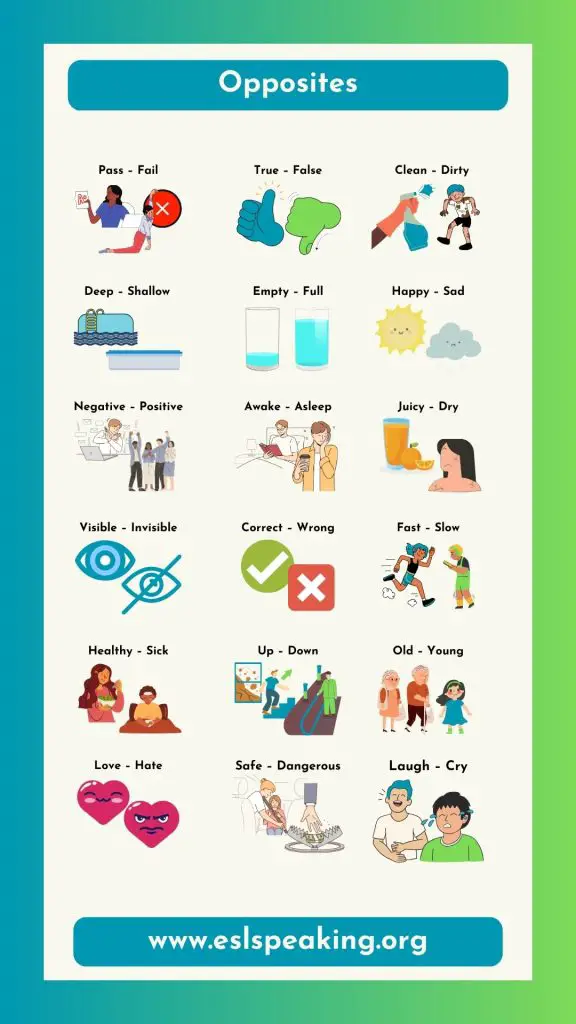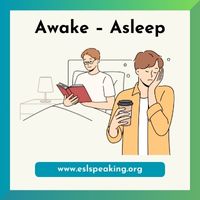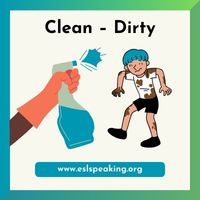Words that have opposite meanings are called antonyms in English. It is possible for a word to have more than one antonym. Because a single word can have more than one definition, the opposite word will vary depending on the context. For example, the word “admit” can have different antonyms like “deny” or “expel” because admit can either mean to acknowledge or to allow to enter.
Among all the opposite words in English, we created the essential list with the most common antonyms. This is a great place to start your learning journey of opposite words.

Antonym Definition
An antonym is a word that has the opposite meaning of another word. For example, “hot” is an antonym of “cold,” and “happy” is an antonym of “sad.” Antonyms are words that express contrasting or opposite ideas. A lot of words have multiple meanings, which results in having multiple antonyms. Oddly, some words can be an antonym to itself. This is when things get a little bit complicated. So, the English language divided antonyms into a few different types.
Types of Antonyms
- Gradable Antonym: Gradeable or graded antonyms represent the extremes of a scale or continuum. The degree of one quality can vary in relation to the other. (Example: Hot-Cold, Tall-Short)
- Complementary Antonym: Complementary antonyms express an either/or relationship, where the presence of one quality implies the absence of the other. In other words, you can only be one or the other. (Example: Alive-Dead, Married-Single)
- Relational Antonym: Relational antonyms are opposites only in the context of a specific relationship. This means that one can’t exist without the other. (Example: Parent-Child, Teacher-Student)
- Auto-antonym (Contronym): Words that can have opposite meanings depending on the context. This is when a single word is its own opposite because it has contradicting definitions. (Example: “cleave” can mean to adhere closely or to split)
List of Antonyms
Here are some of the most common antonym pairs in English.

Awake – Asleep
As the clock struck midnight, Sarah lay peacefully asleep, unaware that her neighbors were already awake, celebrating the New Year with joyful cheers and fireworks.

Clean – Dirty
Tom cleaned his room in the morning, but after playing outside in the afternoon, his shoes were dirty, leaving little marks on the freshly swept floor.

Correct – Wrong
She followed the recipe carefully to make sure the cake turned out correct, but when she accidentally used salt instead of sugar, the result was a cake that tasted wrong.

Deep – Shallow
As he waded into the lake, the water was shallow near the shore, but as he ventured further, it gradually became deep, reaching up to his chest.

Empty – Full
She started with an empty basket at the grocery store, but after filling it with fresh fruits and vegetables, it became full and a bit heavy to carry.

Fast – Slow
The rabbit darted across the field with fast, agile leaps while the turtle moved along at a slow and steady pace, making its way toward the finish line.

Happy – Sad
At the surprise birthday party, she walked into the room to the sound of cheers and laughter, making her eyes light up with a happy smile; however, when she noticed her closest friends couldn’t make it, the guests could tell that she had become a little bit sad.

Healthy – Sick
He used to feel sick all the time, but after making positive changes like exercising and eating well, he gradually became healthy and energetic.

Juicy – Dry
The orange slices were juicy and refreshing, releasing a burst of citrus flavor with each bite. In contrast, the plain crackers on the side were dry and lacked moisture.

Large – Small
In the expansive garden, she planted a row of large sunflowers that swayed in the breeze while a cluster of small, delicate violets bloomed quietly near the garden’s edge.

Laugh – Cry
During the comedy show, the audience couldn’t stop laughing at the comedian’s jokes, yet in the touching finale, a heartfelt story unfolded, leaving some members of the audience crying.

Love – Hate
She couldn’t help but feel love when she held the tiny puppy in her arms, its warm and trusting eyes melting her heart. However, encountering a snake in the backyard triggered an immediate feeling of hate, sending shivers down her spine.

Negative – Positive
Despite facing some negative challenges at work, her positive attitude and determination led to constructive solutions and improvements in her professional life.

Old – Young
In the family photo, the old grandfather smiled warmly, surrounded by the laughter and energy of his young grandchildren playing around him.

Pass – Fail
After hours of diligent studying, she anxiously awaited the exam results. When the grades were posted, relief washed over her as she discovered she had passed, while some of her classmates sadly realized they had failed.

Push – Pull
She struggled to push the overloaded shopping cart up the steep ramp, but a kind stranger stepped forward and offered to help pull it from the other side, making the journey much easier for her.

Rich – Poor
In the rich part of town, the houses were large with sprawling lawns, while in the poor neighborhood, the homes were small and closely packed together.

Safe – Dangerous
The playground at the park is safe for kids to play, but the abandoned building nearby is dangerous and off-limits.

True – False
He shared a true story from his childhood during the family gathering, while his mischievous cousin fabricated a false tale to entertain everyone.

Up – Down
She went up the stairs to find her book, and then, carrying it carefully, she came back down.

Visible – Invisible
As the sun set, the stars became visible in the sky, and the hidden creatures, like owls and bats, stayed mostly invisible in the dark.
Antonyms FAQs
Let’s go over some of the most frequently asked questions about opposite words and antonyms.
What is an antonym?
An antonym is a word that expresses the opposite meaning of another word. For example, “dark” is an antonym of “bright,” and “fast” is an antonym of “slow.” Antonyms help convey contrasting concepts in language.
What are 20 examples of antonyms?
Here is a list of 20 opposite words.
- Hot – Cold
- Tall – Short
- Happy – Sad
- Fast – Slow
- Bright – Dim
- Up – Down
- Big – Small
- Old – New
- Empty – Full
- Loud – Quiet
- Hard – Soft
- Heavy – Light
- Good – Bad
- Forward – Backward
- Win – Lose
- Day – Night
- Brave – Cowardly
- Rich – Poor
- Alive – Dead
- Beautiful – Ugly
What are the different types of antonyms?
The following is the list of the different types of antonyms:
- Gradable Antonyms: Represent extremes on a scale (e.g., hot-cold).
- Complementary Antonyms: Express either/or relationships (e.g., alive-dead).
- Relational Antonyms: Opposites in specific relationships (e.g., parent-child).
- Converses: Describe a relationship from opposite perspectives (e.g., buy-sell).
- Auto-antonyms (Contronyms): Words with opposite meanings based on context (e.g., cleave).
- Gradable through Negation: Formed by adding prefixes (e.g., happy-unhappy).
Can a word have more than one antonym?
Yes, a word can have more than one antonym, depending on the context or the specific aspect of meaning you are considering. Some words may have multiple antonyms because they can contrast with different qualities or characteristics. For example, the word “fast” can have antonyms like “slow,” “gradual,” or “leisurely,” depending on the nuance of speed you want to convey. It’s important to consider the context in which the antonym is used.





Leave a Reply